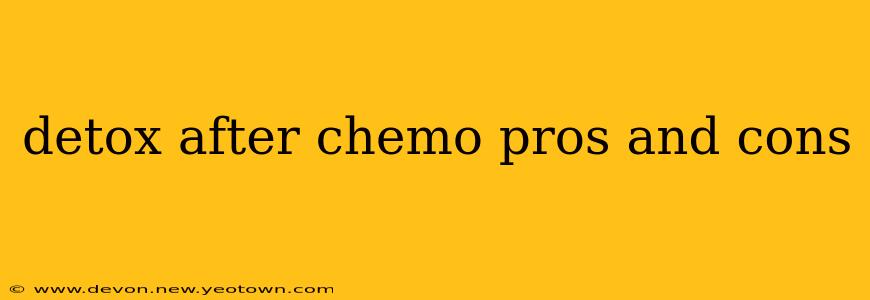Chemotherapy, a powerful weapon in the fight against cancer, can leave its mark on the body. The intense treatment, while effective at targeting cancerous cells, can also affect healthy cells, leading to a range of uncomfortable side effects. This is where the concept of "detox after chemo" often arises – a desire to cleanse the body and alleviate these lingering effects. But is it truly beneficial, and are there potential downsides? Let's explore the pros and cons, separating fact from fiction.
This isn't about a quick-fix miracle cure, but rather a thoughtful exploration of strategies to support your body's natural healing process after the intense demands of chemotherapy.
What is "Detox" After Chemotherapy?
The term "detox" in this context usually refers to various holistic approaches aimed at supporting the body's natural detoxification pathways. It’s not about literally "removing" chemotherapy from your system (your body does that naturally), but rather about mitigating side effects and promoting overall well-being. These approaches can include:
- Dietary changes: Focusing on nutrient-rich foods, antioxidants, and hydration.
- Supplementation: Carefully considering supplements like antioxidants or probiotics (always consult your oncologist).
- Lifestyle modifications: Prioritizing rest, stress management, and gentle exercise.
- Alternative therapies: Exploring practices like acupuncture, massage, or meditation (again, discuss these with your healthcare team).
Pros of Supporting Your Body's Natural Detoxification After Chemo
While the term "detox" is often overused and sometimes misleading, focusing on strategies to support your body's natural healing processes can offer several benefits:
- Improved energy levels: Chemotherapy can be incredibly draining. A healthy diet, sufficient hydration, and regular, gentle exercise can help combat fatigue.
- Reduced nausea and vomiting: A balanced diet can help manage these common side effects.
- Better digestive health: Chemotherapy can disrupt gut flora. Probiotics and a fiber-rich diet can help restore balance.
- Improved sleep: Stress reduction techniques like meditation and yoga can contribute to better sleep quality.
- Enhanced immune system function: A nutritious diet and healthy lifestyle choices can support immune system recovery.
It's crucial to emphasize that these benefits are linked to general health improvements, not a specific "detox" process.
Cons of Uninformed "Detox" Approaches After Chemo
The unregulated nature of many "detox" products and practices presents potential downsides:
- Interaction with chemotherapy: Some supplements or therapies can interact negatively with chemotherapy medications, potentially hindering their effectiveness or increasing side effects. Always consult your oncologist before starting any new supplements or therapies.
- False sense of security: Relying on unproven "detox" methods might delay seeking necessary medical attention for persistent side effects.
- Financial burden: Many "detox" products and treatments can be expensive and not covered by insurance.
- Unnecessary stress: The focus on "detox" can create additional stress and anxiety, especially if results aren't immediate or as expected.
- Lack of scientific evidence: Many detox claims lack robust scientific backing.
What Are the Best Ways to Support My Body After Chemo?
The most effective approach focuses on evidence-based strategies recommended by your healthcare team:
What are some dietary recommendations for after chemo?
A balanced diet rich in fruits, vegetables, whole grains, and lean protein is crucial. Focus on foods high in antioxidants and fiber to support your body's natural healing processes. Stay well-hydrated.
Are there any supplements that are safe to take after chemo?
Always consult your oncologist before taking any supplements. Some might be beneficial, while others could interact negatively with your medications.
What kind of exercise is recommended after chemo?
Gentle exercise, like walking or yoga, can help improve energy levels and reduce fatigue. Start slowly and gradually increase intensity as your body allows.
How can I manage the emotional side effects of chemo?
Chemotherapy can take a toll emotionally. Consider seeking support from a therapist, counselor, or support group. Stress reduction techniques like meditation and mindfulness can also help.
Remember: Focus on a holistic approach that integrates evidence-based medical care with lifestyle adjustments aimed at optimizing your health and well-being. Prioritize communication with your oncology team to ensure your chosen strategies complement your treatment plan and don't interfere with it. The real "detox" is your body's incredible capacity to heal, and supporting that process through healthy choices is paramount.

